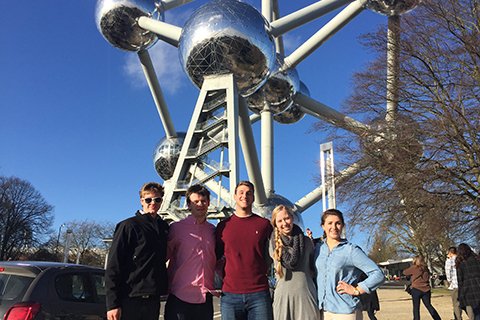Global Exposure

CSE students are gaining global experience through new learning abroad programs and opportunities
Written by Greg Breining
College-sponsored travel abroad has long been popular—even a rite of passage—among students in the liberal arts. Not so much in the College of Science and Engineering, where a large credit load and long list of required classes make it more challenging to fit a semester of travel into a four-year curriculum. As a result, fewer CSE students have studied or traveled as part of their college experience than their liberal arts counterparts.
“That has been changing over the past few years. New programs, including a new freshman seminar launched last year, are giving our students more opportunities to travel, study, and meet colleagues—and still graduate on time. Going global has never been easier,” said Adam Pagel, CSE director of International Programs.
Travel pays off for students in several ways—stronger resumes, sharper skills, and one more way to make an impression in an interview with a global company.
Travel helps students gain a global perspective, said Beth Stadler, professor of electrical and computer engineering. In January 2015, Stadler led one of the first freshman Global Technical Seminars to Germany and Belgium.
“It’s sort of the ‘world is flat’ mentality—that there’s a lot of commonality with people,” she said. “When you’re in your hometown or your home country, you feel that there’s a certain way things are done to be done right. When you go abroad, you realize things can be done differently and still work. But the fundamental things that matter to people are the same worldwide.”
CSE’s longest-standing travel programs have relied on partners and exchange programs, which CSE continues to expand. For example, the college just signed an agreement with the National University of Singapore to send Minnesota students to Singapore and vice-versa. “So it’s a true back and forth, which is usually more affordable for our students than traditional study abroad,” Pagel said.
The greatest growth has come from shorter-term programs, such as CSE’s Global Technical Seminars. More than 100 students each year take advantage of the May and January seminars, sandwiched between semesters. Led by CSE faculty, the seminars usually run about three weeks. Students earn three credits and financial aid and scholarships apply.
“It actually accelerates the students’ graduation because they’re adding three more credits to that year,” said Pagel. “So it shouldn’t delay anyone.”
In January 2015, CSE launched a similar program—but just for freshmen. Held during winter break, 74 freshmen attended nine-day seminars in Hong Kong, Italy, and Germany and Belgium. The seminars reinforced a sense of community among incoming students, gave them time to get to know faculty, helped them imagine what it would be like to work in their engineering field, and taught them basic travel skills.
“Employers don’t necessarily say that study abroad is essential when they’re considering a candidate,” Pagel said. “But when you do ask them what’s high on the list, they often refer to things that are enhanced by going abroad—communication skills, adaptability, leadership, and teamwork. I don’t think a student can expect to sit down and say, ‘I spent a semester in England; you should give me a job.’ But if they talk about the experience and what they gained from it—when they do it eloquently, it’s really an attention grabber.”
Read more about the experiences of three CSE students:
Kelsey Harper: Exploring Belguim and Germany
Sam Finnegan: From Minnesota to Macedonia
Ben Gelhaus: Teaming up in Tanzania
